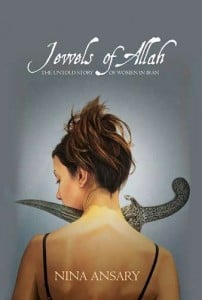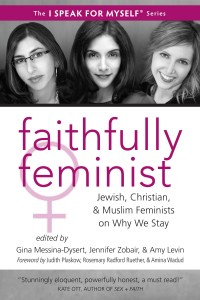A number of initiatives have been launched in the last few years to engage Muslim women in public discussions of issues related to Islam in general. In her post “Reviving the Spirit Without Recognizing Half The Audience?“, Sumaya, a guest contributor to MMW, suggested a list of women who should be invited on such events. One of them is Yasmin Mogahed (who has since spoken at the same conference that Sumaya covered), an internationally-renowned writer and speaker who launched her book, Reclaim Your Heart, in 2012.

Using examples from the Quran and Hadith, Mogahed presents the spiritual journey people go through, with all its success and downturns, in order to reach their goals. Mogahed says that people usually attach themselves to materialistic objects in their lives, forgetting about God, and the life hereafter. She suggests mainly that we, as human beings, should “free our hearts from this slavery.” This book will teach readers how to live in this life without allowing life to own them. In this sense, the book looks like a primer on how to protect their most prized possession – the heart.
Towards the end of the book, Mogahed discusses in details the status of women in Islam. She talks about empowerment of women, arguing that mainstream Western feminists erased God from the scene. The result, according to Mogahed, is that they were left with no other standard, except for men. She writes:
“What (women) did not recognize was that God dignifies both men and women in their distinctiveness – not in their sameness. When we accept men as the standard, suddenly anything uniquely feminine becomes by definition inferior.”
In her book, Mogahed clearly stands against the concept of feminism. She says “Western feminism erases God from the scene, and in that case, there is no standard left, except men.” She suggests that instead of following the ideas presented by feminism, which according to her, consider men the standard, a woman should discover her distinctiveness given to her by God. In Mogahed’s argument, a woman should be looking for privileges given to her and not to men.
The problem I have with Mogahed’s point of view about feminism is that it is looked at from a narrow angle. Feminism is not just about cutting hair short or joining the army like a man, which are examples given by Mogahed. There is much more to it. There are certain social and political roles a woman should be considered to play. There are also workplace, reproductive and electoral rights that feminists are fighting for. I think the chapter about women should have been tackled in a different way, in a way that does not look at men as the only standard, but also at other standards within society that could treat women unfairly. I would grab the opportunity here to use a quote from my colleague, Syma, who explained beautifully the definition of feminism in relation to Islam in the post titled “Responding to the Goatmilk Debates on Islam and Feminism: Part Two.”
“Feminism is simple: the belief that all people, regardless of gender, are and should be equal in the eyes of society and God. The rest becomes technicalities and matters of form that are not quite as important as the belief in egalitarianism…. Feminism feels totally compatible with Islam because its primary aim is to ensure that everyone remains equal, not just in God’s eyes, but society’s eyes as well.”
Mogahed also talks about the objectification of women, and how it is becoming the norm in public discourse. Society, according to Mogahed, has set standards of beauty for women. In that sense, many women became slaves to these standards in order to look beautiful in the eyes of men. What they have to know is that it is important to free themselves from such attachments, “because their bodies and their souls were created for something higher.”
The above disagreements aside, I find Mogahed’s book highly inspiring for a number of reasons. First, she uses a very simple language that is easy to understand and follow. It makes the idea of thinking about the content of her book more simplified and more applicable in real life. Second, towards the end of the book, Mogahed uses real life examples and stories to express her thoughts on any given idea. Those examples derive either from her own life or from the times of Prophet Mohammed, peace be upon him. For example, when she talks about men and how some of them treat women in our time, she invokes the example of harassment in Egypt. Mogahed gives the example of a young Egyptian woman in a taxi, who fought with the driver over money. Since there are no fixed rates for taxi trips, the driver got angry after the woman did not give him the money he requested. So, he grabbed the girl by the shoulder, and started shaking her. When the girl insulted the man as a result of that, he simply punched her face. What disturbed Mogahed the most is the fact that there was a group of men standing by, and none of them moved an inch to help the poor lady.
She also tells the story of the Prophet and how he kissed the grandsons of a villager on their foreheads. The villager said “I have ten children, I have never kissed any of them!” The Prophet looked at him and said “He who does not have mercy for others will not have others show mercy for him.” Mogahed’s use of examples such as this renders the book ideas more relevant to our living experience, and would most probably be easier to follow and practice.
Using examples from the Prophet’s days and from our present time makes it smoother for the reader to understand that there are certain things in life that never change, whatever the time is. These two examples, for instance, call for mercy on women and children. It is something the Prophet used to do, and people these days should be doing. Defining such actions as part of the Prophet’s Sunna makes it motivating for people to believe in and apply in their daily routines.
For some readers, some parts of Mogahed’s book may seem somewhat repetitive, such as her discussions of attachment to God vs. attachment to the materialistic life. However, I believe such a repetition can have positive impact on readers, serving to reinforce ideas in readers’ heads as they go through the book chapters. In addition, frequent references to the same ideas often enrich the discussion, especially when we realize that those ideas are approached from multiple perspectives.
Despite the abovementioned weaknesses when it comes to feminism and gender issues, I would recommend this book to people searching for a greater peace of soul and mind, fewer disappointments, and an enduring sense of achievement. This book could truly be a source of inspiration for people who are feeling ambivalent about different choices in their life. It is also a good starter for those keen on seeing life from different perspectives, and harnessing lessons from Quran and Hadith to improve their living experience.











